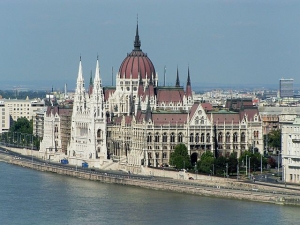Location: Central Europe
Area: 93,028 sq km
Language: Hungarian (Official)
Religion: Roman Catholic, Calvinist, Others
Population: 9,897,541 (July 2015)
Capital: Budapest
GDP: $246.4 billion (2014)
GDP per Capita: $24,900 (2014)
Agriculture: wheat, corn, sunflower seed, potatoes, sugar beets; pigs, cattle, poultry, dairy products
Industries: mining, metallurgy, construction materials, processed foods, textiles, chemicals (especially pharmaceuticals), motor vehicles
Exports:
- $99.54 billion (2014)
- machinery and equipment 53.5%, other manufactures 31.2%, food products 8.7%, raw materials 3.4%, fuels and electricity 3.9%
- Germany 28.8%, Austria 5.8%, Romania 5.7%, Slovakia 5.1%, Italy 4.8%, France 4.7%, Poland 4%, Czech Republic 4%
Imports:
- $96.83 billion (2014)
- machinery and equipment 45.4%, other manufactures 34.3%, fuels and electricity 12.6%, food products 5.3%, raw materials 2.5%
- Germany 25.6%, Austria 7.4%, Russia 7%, China 6.2%, Slovakia 5.5%, Poland 5.3%, France 4.8%, Czech Republic 4.6%, Italy 4.5%, Netherlands 4.1% (2014)
Advantages of Hungarian company
- Dividend and interest payments are tax exempt
- Low corporate tax rate in 10%
- DDT with more than 70 countries in the world
- Minimum share capital of EUR10.000 which, only 50% of that is required to pay at the initial steps of incorporation
- Only one director and one shareholder is required. Non local director is accepted.
Disadvantages of Hungarian company
- The highest rate of 27% VAT in the world
- Non Euro currency(which is unstable for the investment value in EU)
- The percentage of English speaking people is very low and it creates difficulties for foreigner to communicate with clients and suppliers.

